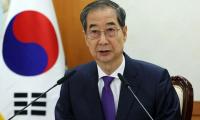Only 37pc schools in Pakistan receive management funds: report
KarachiMost of the government schools in the country receive around Rs22,000 per year for managing their administrative affairs but only 37 percent of them actually receive funds. Out of these, funds were transferred in the first quarter to only 40 percent of the schools while 37 percent received funds in
By our correspondents
November 04, 2015
Karachi
Most of the government schools in the country receive around Rs22,000 per year for managing their administrative affairs but only 37 percent of them actually receive funds.
Out of these, funds were transferred in the first quarter to only 40 percent of the schools while 37 percent received funds in the last quarter.
These were the findings of a report titled “Do Schools Get Money” launched jointly by the Pakistan Coalition for Education (PCE) and Workers Education and Research Organization (WERO) on Tuesday.
One of the researchers who compiled the report, Sufyan Jabbar, while speaking on the launch ceremony said he and his team including Saheem Khizar and Nida Mushtaq surveyed a total of 2,312 government primary schools in 24 districts of Sindh, Punjab, Khayber-Pakhtunkhwa, Balochistan and Azad Jammu and Kashmir.
For the schools where the funds were delivered, said Jabbar, most of the money was spent on new installations, repair and maintenance. “The percentage of the received funds spent on salary, sweepers, payment of utility bills, stationary and uniforms was minimal,” he said.
According to Jabbar, 37 percent of the schools surveyed reported that they had one teacher to teach students in all primary classes. “Our review of school facilities also showed that 74 percent schools reported to have water supply while 78 percent had boundary walls. However, only 43 percent had toilets and 13 percent had access to libraries,” he said.
The study also found that 63 percent of the schools surveyed had not received school council funds for the past year.
Concluding his presentation, he pointed out the need for regular record keeping of school finances and called for increased coordination between local government bodies and school councils to achieve better results.
“We are open to working with the stakeholders to make this data actionable,” he stressed.
The event focused on the findings related to Sindh and was attended by education experts, academia, lawmakers and representatives of the civil society.
Representing the Sindh government, Nasim Qureshi of the education department’s Reform Support Unit shared in detail how money was transferred from the government to school administrations and said the mechanism was changed two years ago to make it more transparent.
“The funding is divided in three sections with each having unique heads to avoid duplication and efficient utilisation of funds,” he stated. Moreover, Qureshi said the method of allocating funds to each school was changed from flat rate to composite rate which provided funds according to the needs of schools. “We are also in the process of hiring officers to monitor this system,” he added.
A passionate discussion erupted when the members of the opposition in Sindh Assembly – lawmakers of the Pakistan Tehreek-e-Insaf and Pakistan Muslim League-Nawaz – criticised Qureshi for sharing wordy details of provincial budget allocation, disbursement and utilisation and described it as cosmetic and ‘only-on-paper’ measures.
Adding to the discussion, a researcher at the Institute for Educational Development of the Aga Khan University, Dr Sajid Ali, said studies had shown that the state of education in Sindh was ‘almost’ at the bottom as compared to other parts of the country.
“We see there is rural-urban difference in fund disbursement and districts close to the centre, such as Karachi, get more funds and earlier than others,” he said.
Commenting on the report, Ali said the reliability and authenticity of the findings will increase manifold if there was quantitative cross-checking. “The impact of the results could be remarkable then,” he stressed.
He recommended that the findings be shared with lawmakers and voters of the areas surveyed to make the data actionable. “We know the hypothesis that more budget leads to better learning is incorrect and hence there is a need for accountability of each school to ensure quality,” he said.
Continuing with the discussion, Asghar Soomro of Education Fund for Sindh said there was a need to find and discuss the factors leading to the problems pointed out in the report. “We all collect data but what conclusions we draw from them is more important,” he said, calling on comparison of education standards in difference provinces and adopting best practices.
A senior leader of PML-N, Haji Shafiq Jamot, called for evaluation of the state of education in Sindh, acknowledging the problems and learning from others. “No amount of development will benefit the nation if there is no quality education,” he stressed.
Most of the government schools in the country receive around Rs22,000 per year for managing their administrative affairs but only 37 percent of them actually receive funds.
Out of these, funds were transferred in the first quarter to only 40 percent of the schools while 37 percent received funds in the last quarter.
These were the findings of a report titled “Do Schools Get Money” launched jointly by the Pakistan Coalition for Education (PCE) and Workers Education and Research Organization (WERO) on Tuesday.
One of the researchers who compiled the report, Sufyan Jabbar, while speaking on the launch ceremony said he and his team including Saheem Khizar and Nida Mushtaq surveyed a total of 2,312 government primary schools in 24 districts of Sindh, Punjab, Khayber-Pakhtunkhwa, Balochistan and Azad Jammu and Kashmir.
For the schools where the funds were delivered, said Jabbar, most of the money was spent on new installations, repair and maintenance. “The percentage of the received funds spent on salary, sweepers, payment of utility bills, stationary and uniforms was minimal,” he said.
According to Jabbar, 37 percent of the schools surveyed reported that they had one teacher to teach students in all primary classes. “Our review of school facilities also showed that 74 percent schools reported to have water supply while 78 percent had boundary walls. However, only 43 percent had toilets and 13 percent had access to libraries,” he said.
The study also found that 63 percent of the schools surveyed had not received school council funds for the past year.
Concluding his presentation, he pointed out the need for regular record keeping of school finances and called for increased coordination between local government bodies and school councils to achieve better results.
“We are open to working with the stakeholders to make this data actionable,” he stressed.
The event focused on the findings related to Sindh and was attended by education experts, academia, lawmakers and representatives of the civil society.
Representing the Sindh government, Nasim Qureshi of the education department’s Reform Support Unit shared in detail how money was transferred from the government to school administrations and said the mechanism was changed two years ago to make it more transparent.
“The funding is divided in three sections with each having unique heads to avoid duplication and efficient utilisation of funds,” he stated. Moreover, Qureshi said the method of allocating funds to each school was changed from flat rate to composite rate which provided funds according to the needs of schools. “We are also in the process of hiring officers to monitor this system,” he added.
A passionate discussion erupted when the members of the opposition in Sindh Assembly – lawmakers of the Pakistan Tehreek-e-Insaf and Pakistan Muslim League-Nawaz – criticised Qureshi for sharing wordy details of provincial budget allocation, disbursement and utilisation and described it as cosmetic and ‘only-on-paper’ measures.
Adding to the discussion, a researcher at the Institute for Educational Development of the Aga Khan University, Dr Sajid Ali, said studies had shown that the state of education in Sindh was ‘almost’ at the bottom as compared to other parts of the country.
“We see there is rural-urban difference in fund disbursement and districts close to the centre, such as Karachi, get more funds and earlier than others,” he said.
Commenting on the report, Ali said the reliability and authenticity of the findings will increase manifold if there was quantitative cross-checking. “The impact of the results could be remarkable then,” he stressed.
He recommended that the findings be shared with lawmakers and voters of the areas surveyed to make the data actionable. “We know the hypothesis that more budget leads to better learning is incorrect and hence there is a need for accountability of each school to ensure quality,” he said.
Continuing with the discussion, Asghar Soomro of Education Fund for Sindh said there was a need to find and discuss the factors leading to the problems pointed out in the report. “We all collect data but what conclusions we draw from them is more important,” he said, calling on comparison of education standards in difference provinces and adopting best practices.
A senior leader of PML-N, Haji Shafiq Jamot, called for evaluation of the state of education in Sindh, acknowledging the problems and learning from others. “No amount of development will benefit the nation if there is no quality education,” he stressed.
-
 Everything You Need To Know About Macron’s Viral Glasses: Cost, Model, All Details Revealed
Everything You Need To Know About Macron’s Viral Glasses: Cost, Model, All Details Revealed -
 Elon Musk Warns Of AI ‘supersonic Tsunami’: What It Means For Future
Elon Musk Warns Of AI ‘supersonic Tsunami’: What It Means For Future -
 Why Victoria Beckham's Dance Video From Brooklyn's Wedding Won't Be Released
Why Victoria Beckham's Dance Video From Brooklyn's Wedding Won't Be Released -
 Prince Harry No Longer Focused On Healing Royal Family Feud?
Prince Harry No Longer Focused On Healing Royal Family Feud? -
 OpenAI Aims To Make AI A Daily Global Tool
OpenAI Aims To Make AI A Daily Global Tool -
 Will Andrew Receive Any Royal Treatment After Title, Royal Lodge Removal?
Will Andrew Receive Any Royal Treatment After Title, Royal Lodge Removal? -
 How Your Body 'suffers' In Back Pain And Simple Way To Fix It
How Your Body 'suffers' In Back Pain And Simple Way To Fix It -
 What Victoria Beckham Really Did At Brooklyn, Nicola’s Wedding Revealed
What Victoria Beckham Really Did At Brooklyn, Nicola’s Wedding Revealed -
 Send Your Name To Moon With Nasa’s Artemis Mission: Here’s How
Send Your Name To Moon With Nasa’s Artemis Mission: Here’s How -
 Zhipu AI, MiniMax Debuts Mask Structural Hurdles For China’s Tech Giants
Zhipu AI, MiniMax Debuts Mask Structural Hurdles For China’s Tech Giants -
 ‘Stargate Community’: Inside OpenAI’s Plan To Cut AI Data Center Energy Costs
‘Stargate Community’: Inside OpenAI’s Plan To Cut AI Data Center Energy Costs -
 Could Brooklyn Beckham Drop His Surname Following Family Feud?
Could Brooklyn Beckham Drop His Surname Following Family Feud? -
 Rachel McAdams Becomes Object Of Jokes At Hollywood Star Of Fame Event
Rachel McAdams Becomes Object Of Jokes At Hollywood Star Of Fame Event -
 South Korea's Ex-PM Han Duck-soo Jailed For 23 Years Over Martial Law Crises
South Korea's Ex-PM Han Duck-soo Jailed For 23 Years Over Martial Law Crises -
 Global Markets On Edge Over Greenland Dispute: Is US Economic Leadership At Risk?
Global Markets On Edge Over Greenland Dispute: Is US Economic Leadership At Risk? -
 King, Queen Visit Deadly Train Crash Site
King, Queen Visit Deadly Train Crash Site



